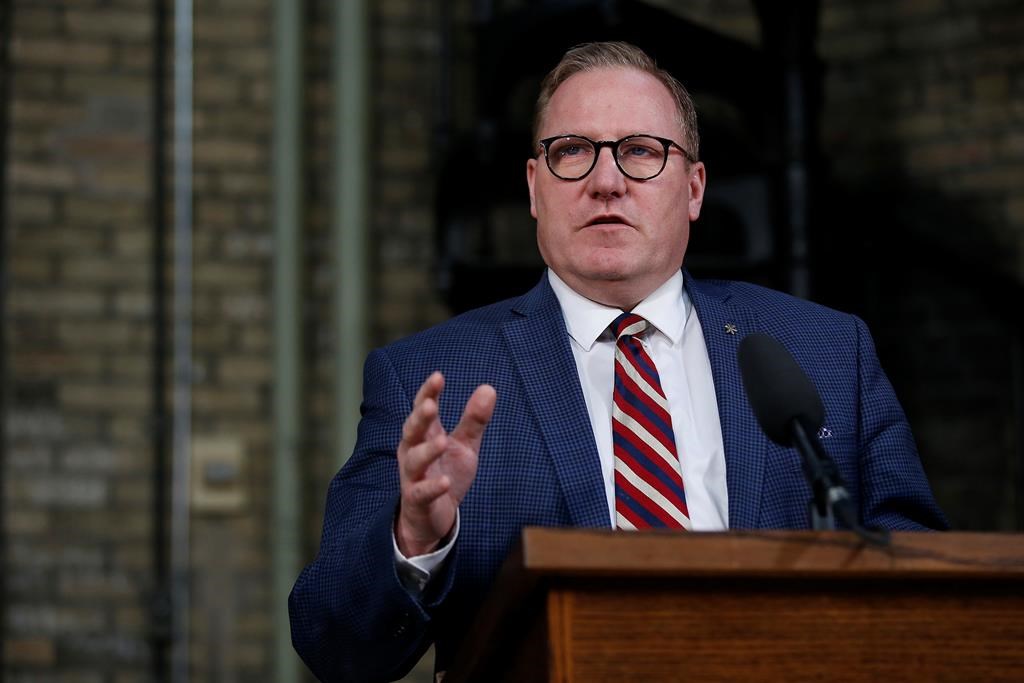The Manitoba government plans to keep a tight leash on spending while preparing for the effects of COVID-19 and natural emergencies in the 2020-21 provincial budget.

The budget was finally tabled Thursday afternoon, more than a week later than planned after the NDP used parliamentary privilege to delay the PCs from releasing it.
But the document was a bit different than originally planned due the province’s ongoing efforts to fight the COVID-19 pandemic.
Manitoba announced its first case of novel coronavirus last Thursday, just a day after the budget was originally set to be presented.
An emergency supplement to the budget tabled Thursday includes a top up to the rainy day fund, bringing it to $800 million over the next month, and a plan to transfer another $72 million by the end of the 2020-21 fiscal year.
The province says they also have $18 million in federal funding for the virus, and expect more.
Finance Minister Scott Fielding estimates that because of COVID-19, health costs this year could rise between $50 million and $200 million.
Reduced economic growth could lower government revenues by anywhere from $160 million to $682 million, the government estimates.
Fielding said Manitoba has nearly $1 billion of financial flexibility to address this adversity.

Get daily National news
“Budget 2020 takes measures that serve as the foundation for the Manitoba government’s fiscal response to the fast-evolving public health and economic challenges posed by the COVID-19 pandemic,” he said in a release Thursday.
“Budget 2020 sets aside the largest amount of money in Manitoba history for emergency expenditures, and Manitobans should be reassured by this unprecedented level of fiscal resilience and flexibility to quickly deliver the resources required to respond to any emergency.”
The province reiterated its commitment to implement the $25-per-tonne carbon tax, and to combat that rise with a reduction of 1 percentage point for the PST to 6 per cent. Both measures had been previously announced.
The province may have been able to run a surplus this year, Fielding said last week, but added the province wanted to make sure they had money for emergency spending.
“We think it’s more prudent to be the most flood and emergency-ready province.”
The provincial deficit is projected at $220 million for 2020 — but that does not include the $160 million to $682 million the government thinks we may see in reduced economic growth due to COVID-19.
Manitoba’s current debt is about $26 billion.
The budget focuses on incremental fee reductions, reducing the provincial deficit and infrastructure spending.
The Opposition New Democrats say the budget contains little help for people facing layoffs or sick leave due to the pandemic.
They want the province to top-up money offered by employment insurance and private workplace health programs.
How you will save money:
- Vehicle registration fees will drop 10 per cent.
- Probate fees will be eliminated.
- PST to drop to 6 per cent on July 1.
- No longer pay PST for preparing your taxes starting Oct. 1.
- No longer pay PST for preparing your will.
- Personal income tax exemption will go up to $9,809.
Where you will spend more money:
- Taxes will go up on cigarettes and tobacco to offset the reduction of PST.
- Gas will go up 5.3 cents per litre – or about $2.65 a tank.
- Diesel will go up 6.74 cents per litre.
- Natural gas will go up 4.74 cents per cubic metre.
- Propane will go up 3.84 cents per litre.
Other highlights:
- Pot will bring in a net revenue of $15 million to the province, which the province remarked that “cannabis revenues are not the fiscal windfall that some had forecast.”
- The COVID-19 coronavirus is mentioned only as a possible strain on the budget, but not to what extent.
- Infrastructure spending on roads and bridges is $494 million, up 7.2 per cent from last year
- Health spending goes up by $157 million to $6.8 billion.
- More money for cataract and knee replacement surgeries, about $10 million.
- A report on education reform is expected in the coming weeks, and the province has set aside $5 million to help pay for changes.
- A pledge to increase jobs in the province by 40,000 over the next four years.
- An additional $67 million over three years for mental health and addictions treatment, including 100 beds for those transitioning back into the community.
- Corporations can start their own daycare and get a $2,500 per year tax credit per child space over the next four years, with no charging caps.
- An additional $2.7 million for non-profit childcare spaces.
- Daycares can apply for grants through a new $11.5 million endowment fund to repair their centres.
- More financial assistance to students, but about $7.5 million less for universities and colleges.
- $160 million for school builds and renovations.
- Deals on transit and green funding between the province and the feds is essentially done, but deals between the province and the city are still being worked out.
- Fielding confirmed the province is moving to a “more regulatory model” for Manitoba Housing — while moving away from owning public housing.
–With files from Shane Gibson and The Canadian Press










Comments